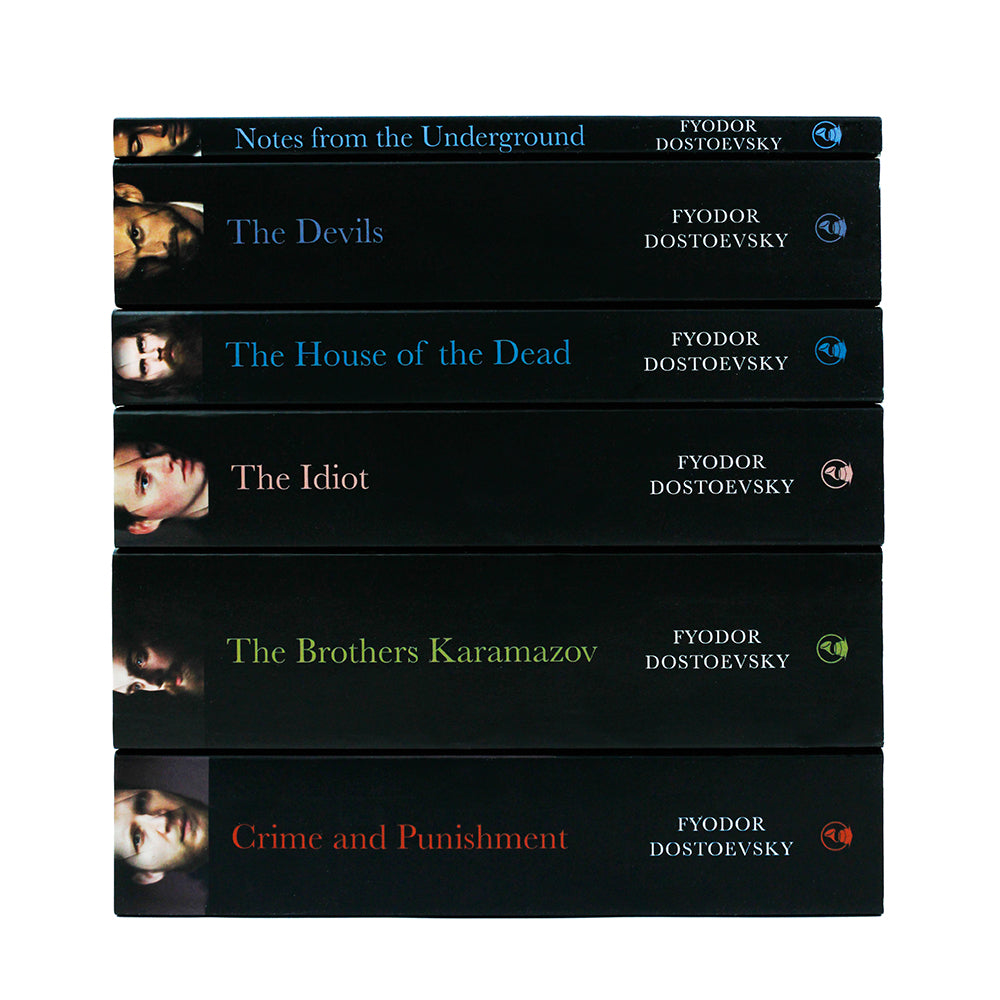







The Complete Collection of Fyodor Dostoevsky 6 Books Box Set Notes From The Underground, Crime and Punishment, The Brothers Karamazov, The Devils, The Idiot & The House of the Dead)
Get 5% OFF Your First Order🏷️ Use Code At Checkout: Miina5
🏷️ More Deals!
6% off 2+ products! Use code at checkout: 6Off
8% off 3+ products! Use code at checkout: 8Off
10% off 4+ products! Use code at checkout: 10Off
Barcode: 9789123484300
Description
Titles In this Set
Notes From The Underground
Crime and Punishment
The Brothers Karamazov
The Devils
The Idiot
The House of the Dead.
Notes From The Underground
"But what can a decent man speak of with most pleasure? Answer: Of himself. Well, so I will talk about myself."
Notes from the Underground by Fyodor Dostoevsky is believed to be one of the earliest existential novels to be written. Recounted in the form of memories, the unnamed narrator describes a life of morbid isolation, that festers within itself anger, envy and self-hate. Written with biting sarcasm, the story reveals a suffering and tortured soul.
Crime and Punishment
"It's a lesson," he thought, turning cold. "This is beyond the cat playing with a mouse... What is it? It's all nonsense, my friend, you are pretending, to scare me! You've no proofs... You simply want to make me lose my head, to work me up beforehand and so to crush me... Is he reckoning on my shattered nerves?"
Fyodor Dostoevsky's Crime and Punishment is an intense psychological drama that explores the mind of a murderer, laying bare its torment in minute detail.
The Brothers Karamazov
"Fyodor Pavlovitch... began with next to nothing; his estate was of the smallest; he ran to dine at other men's tables, and fastened on them as a toady... he was all his life one of the most senseless, fantastical fellows in the whole district. I repeat, it was not stupidity the majority of these fantastical fellows are shrewd and intelligent enough but just senselessness, and a peculiar national form of it."
The Brothers Karamazov was Fyodor Dostoevsky's last work and one of the best stories ever written.
The Devils
A new "sensation," another murder! But there was another element in this case: it was clear that a secret society of murderers, incendiaries, and revolutionists did exist, did actually exist."
The Devils, also known as The Possessed, by Fyodor Dostoevsky is a dark and terrifying portrayal of young men steeped in revolutionary ideology and bent upon chaos.
The Idiot
"Both were young fellows, both were rather poorly dressed, both had remarkable faces... If they had but known why, at this particular moment, they were both remarkable persons, they would undoubtedly have wondered at the strange chance which had set
them down opposite to one another in a third-class carriage of the Warsaw Railway Company.
The Idiot by Fyodor Dostoevsky is the tale of good and innocence in a world consumed with sin and treachery.
The House of the Dead
"Recollections of the Dead-House... revealed quite a new world unknown till then;... in the strangeness of his facts, together with his singular remarks on this fallen people..."
The House of the Dead by Fyodor Dostoevsky, based on the author's own experiences as a political prisoner, exposes and explains life in a Siberian prison camp.
From the notes of Alexander Petrovitch, a nobleman deported to Siberia for murdering his wife, the reader is made conscious of the harrowing conditions - the filth, the inedible cabbage soup, the terrible sleeping conditions, the inhuman punishments
in a Siberian prison. Most importantly, he observes the psychological effects of imprisonment - from the intense yearning for freedom to the acceptance of life in prison. A genre-defying narrative, this book is a journey of understanding and enlightenment.
The Complete Collection of Fyodor Dostoevsky 6 Books Box Set Notes From The Underground, Crime and Punishment, The Brothers Karamazov, The Devils, The Idiot & The House of the Dead)
Book Information
Complete details about this book
PUBLISHER
Classic EditionsFormat
Paperback
Turn Curiosity Into Discovery
Discover a world of books at Miina Books from gripping fiction and insightful non-fiction to educational titles and wellness guides. Whether you're reading for pleasure, learning, or growth, we have something for every reader. Explore stories, spark ideas, and find inspiration on every shelf.
- Related products
- Recently viewed




